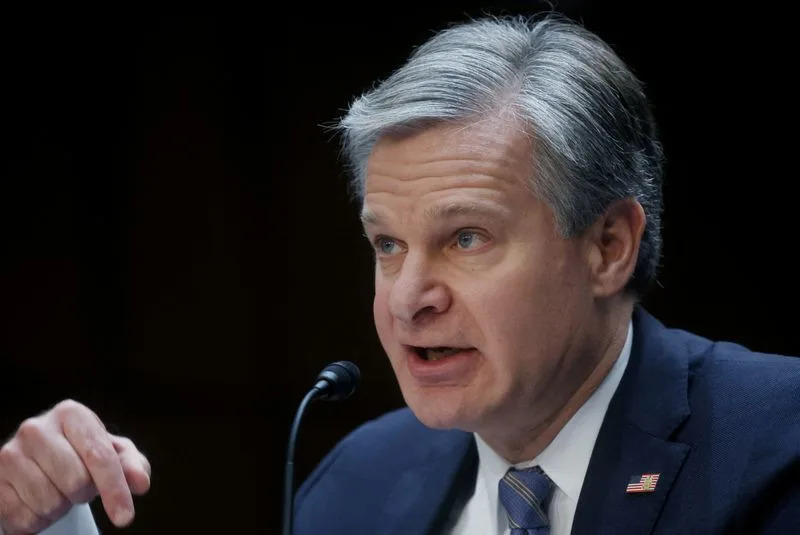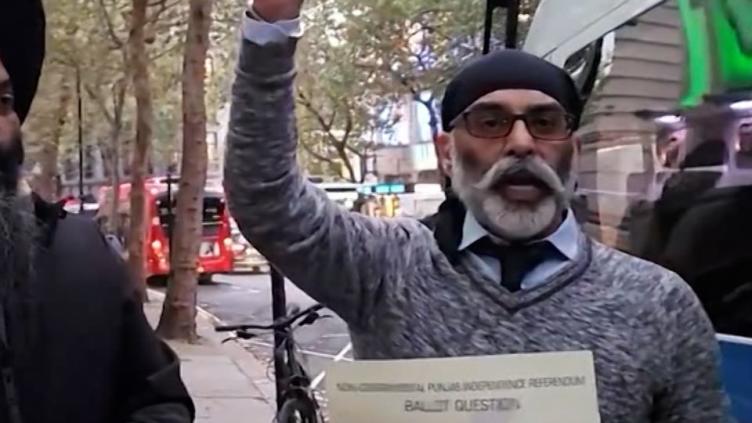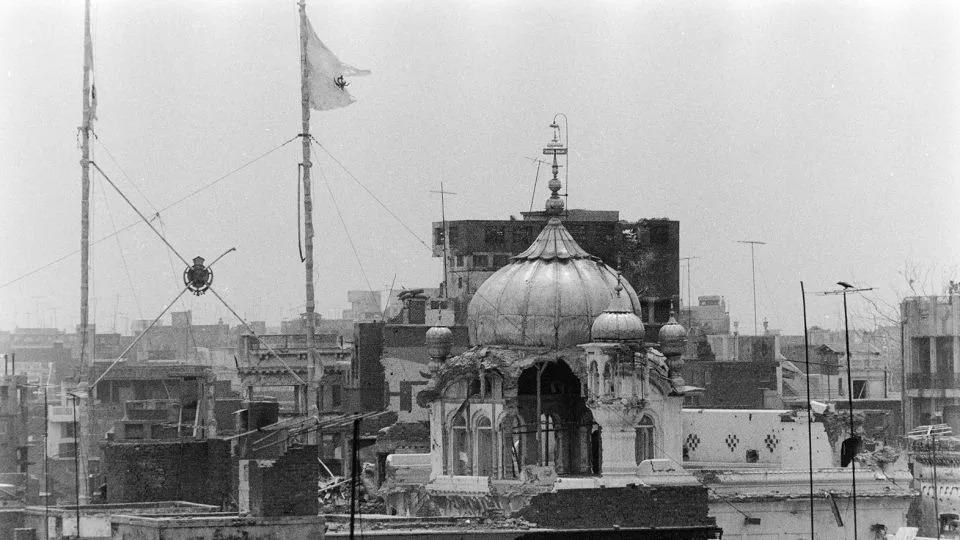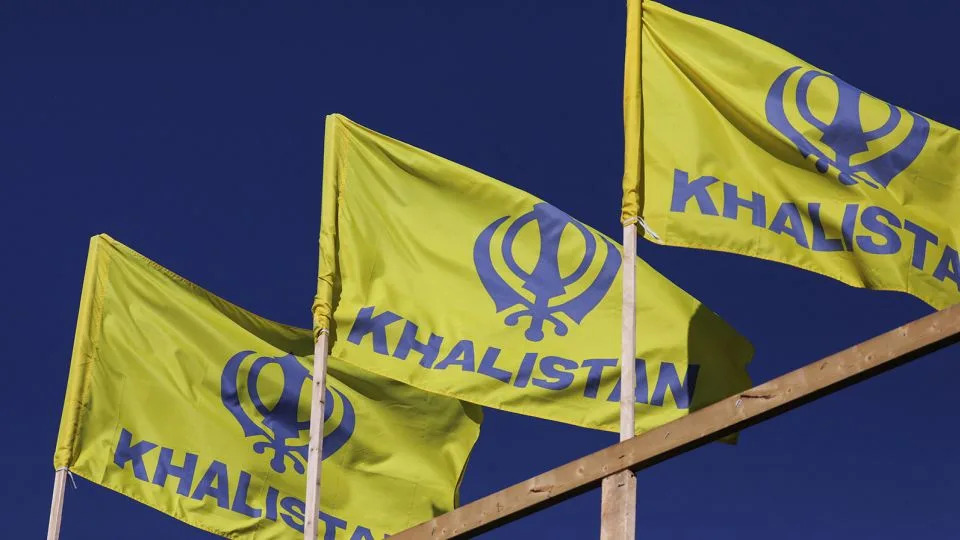Updated Tue, December 12, 2023

FBI Director Wray testifies on Capitol Hill in Washington, U.S
By Rupam Jain
NEW DELHI (Reuters) -India has asked the United States to share intelligence on Sikh separatists living there amid investigations into an accusation that an Indian official was linked to a plot to kill a Sikh separatist on American soil, an Indian official said on Tuesday.
The request was made by the National Investigations Agency (NIA), India's federal anti-terrorism agency, in meetings with visiting FBI Director Christopher Wray, said the official, who works at the NIA and spoke on condition of anonymity.
The issue of what New Delhi says are Sikh separatists operating against India from U.S. soil was discussed in "greater detail by a team of internal security officials from both countries", the official said.
"India has requested the U.S. officials to share inputs on suspected individuals who have in recent years been recruited and embedded in the separatist movement," the official said.
The NIA said in a statement on Tuesday that Wray met NIA Director General Dinkar Gupta and held discussions on issues including "the acts and activities of Terrorist-Organised Criminal Networks, ongoing investigations in the US in the attack on the Indian consulate in San Francisco, investigations of cyber-terror and cyber-crimes of various kinds."
A U.S. embassy spokesperson said meetings between Wray and Indian officials were underway but was unable to share details yet.
The movement for a Sikh homeland in northern India, crushed decades ago, has burst onto the global stage in recent months as the United States and Canada accused Indian officials of involvement in assassination plots against Sikh separatist leaders in North America.
New Delhi denies any connection to a June murder in a Vancouver suburb but has announced an investigation into U.S. concerns about an alleged plot in New York.
It says such plots were not government policy and it is not hunting down Sikh separatists abroad. Indian security and foreign ministry officials say Sikh separatists in North America and Europe raising money, training people and campaigning for India’s division, is a concern for New Delhi.
India has sought to distance the FBI chief's visit - the first in years - from the New York case, saying Wray's trip had been planned for some time.
(Reporting by Rupam Jain, editing by YP Rajesh and Angus MacSwan)
FBI chief in India following explosive US assassination plot indictment
CNN Staff
Tue, December 12, 2023

FBI director Christopher Wray is in India this week for a trip aimed at strengthening security cooperation and deepening a partnership. But it comes in the wake of a major law enforcement issue between the two nations – one far more sinister and with the potential to cause cracks within that alliance.
Just two weeks ago, the United States accused an Indian government official of being involved in a conspiracy to kill an American citizen on its home soil.
The citizen in question is Gurpatwant Singh Pannun, a Sikh separatist, who was allegedly the target of a murder-for-hire plot in New York City.
Pannun is a wanted man in India – considered by the government there as a terrorist and national security threat. But to some Sikhs overseas, Pannun is an outspoken activist and a man rallying for a cause that has come to unite large swaths of the community’s international diaspora.
Late last month, US federal prosecutors charged an Indian national on suspicion of trying to kill him, according to an explosive indictment, which alleged the hitman was acting upon orders from an unnamed Indian government official.
The stunning revelation came little more than a month after Canada’s Prime Minister Justin Trudeau publicly alleged that India may have been involved in the murder of another Sikh separatist, Hardeep Singh Nijjar, on its soil, prompting a furious response from New Delhi and provoking a diplomatic fallout between the two countries. India has vehemently denied involvement in Nijjar’s murder.
The US plot was foiled and the details in the indictment have yet to be heard in court.
But the episode has cast “a dark shadow on New Delhi’s credibility,” wrote Suhasini Haider, the diplomatic affairs editor at The Hindu newspaper, in one of her recent editorials.
And it has many asking: How badly had this hit New Delhi’s ties with Washington?
Taking matters seriously
India’s government has denied any involvement in the alleged plot to kill Pannun. But in contrast to the vocal condemnation it made after Canada’s accusation, it has set up a high-level committee to investigate the accusations in the US indictment.
“As regards the case against an individual that has been filed in a US court, allegedly linking him to an Indian official, this is a matter of concern,” India’s foreign ministry said after the indictment was revealed.
The cause Pannun has been campaigning for is the creation of a separate Sikh homeland – one that would be known as Khalistan and include the state of Punjab in India.
Khalistan has long been outlawed in the world’s largest democracy, where painful memories of a deadly insurgency by some Sikh separatists continue to haunt many Indian citizens. But it garners a level of sympathy among some in the Sikh diaspora overseas, where protected by free speech laws, people like Pannun are able to openly advocate for secession from India.
The topic is highly charged. Four decades ago India’s former prime minister Indira Gandhi was assassinated by her Sikh bodyguards after she sent army troops charging inside the religion’s holiest shrine to flush out separatists that had been harboring inside. That operation, known as Blue Star, destroyed much of the building and left hundreds dead.

The first photos of the damaged Akal Takhat after the army action named Operation Blue Star on the sikh Golden Temple complex in Amritsar, June 9, 1984.
- Sondeep Shankar/Hulton Archive/Getty Images
Riots broke out in the days after Gandhi’s murder, killing some 3,000 people – predominantly Sikhs – according to official figures, in one of the worst outbreaks of communal violence since India’s partition.
In the years since, those pursuing the Khalistan cause have formed a minority in Punjab given the government’s banning of the movement – and linked extremism doesn’t pose a significant threat to the country, analysts say.
But seeking reconciliation for what they view as human rights abuses committed against their community, several overseas Sikh organizations continue to advocate for Punjab secession and say the Khalistan movement is being falsely equated with terrorism by the Indian government.
Despite this, the government’s response to campaigners overseas remains robust, particularly under current Prime Minister Narendra Modi.
“India went through a very difficult phase with the Khalistan movement in 1980s. It defined their national security,” said Harsh Pant, vice-president of the Observer Research Foundation, a New Delhi think tank. “Therefore, the Indian state tends to take a very serious view of these things.”
No dent in relations
Pannun, the Sikh separatist wanted by the Indian government, was a close associate of Nijjar, who was also wanted by India for terrorism related offenses.
A fiery orator Pannun has repeatedly made comments that are perceived as secessionist and threatening toward India and its government.
He is wanted on more than a dozen terrorism charges in India and accused of trying to radlicalize his community in support of the creation of Khalistan – an independent Sikh homeland that would include parts of India. India has outlawed the US-based secessionist group, Sikhs for Justice, headed by Pannun, which holds referendums among diaspora groups in support of Khalistan.
In a widely circulated video last month, he warned Sikhs not to fly Air India on November 19, citing “danger” to their lives. Headlines reverberated across India in the days that followed claiming Pannun was threatening to “blow up” the aircraft.
Pannun told CNN he was “not surprised” by the indictment outlining the foiled plot to kill him.
“The government of India has officially declared a reward on (my) head for running the global Khalistan Referendum campaign,” he said, referring to votes the Sikh diaspora around the world have held on gathering support for a separate homeland.
Asked by CNN if we was a threat to India, as New Delhi claims, he replied: “While my advocacy surely challenges India’s territorial integrity… this challenge is through ballots and not bullets, hence the challenge I pose is not considered terrorism under UN and international laws.”
On his remarks about Air India, he said comments in the Indian media were often misrepresented.
“My video message is to ‘boycott’ Air India not ‘bomb’,” he said. “This is a disinformation tactic of India’s Modi government to equate a non-violent call of ‘boycott’ with terrorism.”
Analysts say Pannun’s inflammatory rhetoric – and the media hype that surrounds him in India – could provoke backlash from citizens and prompt a government response.
“When you have someone making these statements regularly and Indian media broadcasting them, it takes the conversation beyond the confines of diplomacy,” Pant said. “Many Indians might ask why the US government is tolerating such behavior. The public perception of the danger may be much higher than the danger itself.”

Pro-indepence Khalistan flags are seen at the Guru Nanak Sikh Gurdwara temple, site of the June 2023 killing of Sikh leader Hardeep Singh Nijjar, in Surrey, British Columbia, Canada September 20, 2023. - Chris Helgren/Reuters
To some, the Indian government’s alleged pursuit of an American citizen on its home soil might appear risky and put a dent in relations between two countries that have recently rapidly strengthened economic, technological and defense ties.
However, analysts say the chances of a major fallout are low as both are committed to countering the rise of a neighboring superpower that they view as a joint concern – China.
“The common wisdom is that the US and India need each other for vital strategic purposes: above all, to mount an effective front in competition with China,” said Daniel S. Markey, senior adviser, South Asia, for the United States Institute of Peace.
“Therefore, they will manage this issue without being sidetracked from that mission. And, to date, the two sides have avoided acrimonious public statements, pledging to take the matter seriously.”
And there is recent past precedent for this kind of pragmatic realpolitik.
The murder in Saudi Arabia’s Istanbul consulate of Jamal Khashoggi, a US resident and Washington Post columnist critical of the Saudi government, caused global outrage and US condemnation at the time. But ultimately the vital relationship between Washington and Riyadh has been stabilized.
In a statement on Monday announcing Wray’s visit, India’s Central Bureau of Investigation – the equivalent to the FBI – said their meeting signified “a step towards deepening cooperation and shared commitment to combat crime in all its manifestations in the spirit of international police cooperation”.
The statement did not mention the US indictment.
Riots broke out in the days after Gandhi’s murder, killing some 3,000 people – predominantly Sikhs – according to official figures, in one of the worst outbreaks of communal violence since India’s partition.
In the years since, those pursuing the Khalistan cause have formed a minority in Punjab given the government’s banning of the movement – and linked extremism doesn’t pose a significant threat to the country, analysts say.
But seeking reconciliation for what they view as human rights abuses committed against their community, several overseas Sikh organizations continue to advocate for Punjab secession and say the Khalistan movement is being falsely equated with terrorism by the Indian government.
Despite this, the government’s response to campaigners overseas remains robust, particularly under current Prime Minister Narendra Modi.
“India went through a very difficult phase with the Khalistan movement in 1980s. It defined their national security,” said Harsh Pant, vice-president of the Observer Research Foundation, a New Delhi think tank. “Therefore, the Indian state tends to take a very serious view of these things.”
No dent in relations
Pannun, the Sikh separatist wanted by the Indian government, was a close associate of Nijjar, who was also wanted by India for terrorism related offenses.
A fiery orator Pannun has repeatedly made comments that are perceived as secessionist and threatening toward India and its government.
He is wanted on more than a dozen terrorism charges in India and accused of trying to radlicalize his community in support of the creation of Khalistan – an independent Sikh homeland that would include parts of India. India has outlawed the US-based secessionist group, Sikhs for Justice, headed by Pannun, which holds referendums among diaspora groups in support of Khalistan.
In a widely circulated video last month, he warned Sikhs not to fly Air India on November 19, citing “danger” to their lives. Headlines reverberated across India in the days that followed claiming Pannun was threatening to “blow up” the aircraft.
Pannun told CNN he was “not surprised” by the indictment outlining the foiled plot to kill him.
“The government of India has officially declared a reward on (my) head for running the global Khalistan Referendum campaign,” he said, referring to votes the Sikh diaspora around the world have held on gathering support for a separate homeland.
Asked by CNN if we was a threat to India, as New Delhi claims, he replied: “While my advocacy surely challenges India’s territorial integrity… this challenge is through ballots and not bullets, hence the challenge I pose is not considered terrorism under UN and international laws.”
On his remarks about Air India, he said comments in the Indian media were often misrepresented.
“My video message is to ‘boycott’ Air India not ‘bomb’,” he said. “This is a disinformation tactic of India’s Modi government to equate a non-violent call of ‘boycott’ with terrorism.”
Analysts say Pannun’s inflammatory rhetoric – and the media hype that surrounds him in India – could provoke backlash from citizens and prompt a government response.
“When you have someone making these statements regularly and Indian media broadcasting them, it takes the conversation beyond the confines of diplomacy,” Pant said. “Many Indians might ask why the US government is tolerating such behavior. The public perception of the danger may be much higher than the danger itself.”

Pro-indepence Khalistan flags are seen at the Guru Nanak Sikh Gurdwara temple, site of the June 2023 killing of Sikh leader Hardeep Singh Nijjar, in Surrey, British Columbia, Canada September 20, 2023. - Chris Helgren/Reuters
To some, the Indian government’s alleged pursuit of an American citizen on its home soil might appear risky and put a dent in relations between two countries that have recently rapidly strengthened economic, technological and defense ties.
However, analysts say the chances of a major fallout are low as both are committed to countering the rise of a neighboring superpower that they view as a joint concern – China.
“The common wisdom is that the US and India need each other for vital strategic purposes: above all, to mount an effective front in competition with China,” said Daniel S. Markey, senior adviser, South Asia, for the United States Institute of Peace.
“Therefore, they will manage this issue without being sidetracked from that mission. And, to date, the two sides have avoided acrimonious public statements, pledging to take the matter seriously.”
And there is recent past precedent for this kind of pragmatic realpolitik.
The murder in Saudi Arabia’s Istanbul consulate of Jamal Khashoggi, a US resident and Washington Post columnist critical of the Saudi government, caused global outrage and US condemnation at the time. But ultimately the vital relationship between Washington and Riyadh has been stabilized.
In a statement on Monday announcing Wray’s visit, India’s Central Bureau of Investigation – the equivalent to the FBI – said their meeting signified “a step towards deepening cooperation and shared commitment to combat crime in all its manifestations in the spirit of international police cooperation”.
The statement did not mention the US indictment.
‘Reputational cost’
The measured US-India response, to some, might suggest India’s top-most officials weren’t privy to the alleged plot.
“I find it very difficult to accept the logic that it goes all the way to the top,” said Pant. “Primarily, because I think the costs are too high… And if you assume that this is a rogue element, then I think the question is who lost control?”
The US indictment alleged that Nikhil Gupta, 52, worked with an unnamed Indian official to set up a meeting with an undercover officer he believed to be a hitman to target Pannun. The Indian official agreed to pay $100,000 to the undercover officer for the arranged murder, according to prosecutors.
But the hitman contacted by Gupta was in fact an undercover officer from the Drug Enforcement Agency, according to the DEA. Gupta was arrested in June of this year in the Czech Republic where he is pursuant to a bilateral extradition treaty.
In India at least, the incident has done little to damage the government’s reputation.
“Some hard-liners may actually take pride in this episode as a demonstration of Indian muscle and believe it is a necessary deterrent against other overseas critics of the Indian state,” said Markey from USIP.
Pant said while there might be “fringe” support for the alleged attempt on Pannun’s life, the government “understands the complexities” of the case.
“That’s why you’ve seen that very swiftly, there has been a response to America and a committee has been constituted (to investigate),” he added. “Because I think the implications are quite serious.”
However, if the alleged ties to the Indian government are proven, Markey said, the country’s professional intelligence officers will “pay a reputational cost.”
“India’s diplomats, especially in Washington and Ottawa, will be left to clean up that mess,” he said.
Joe Biden ‘drops out of high-profile India visit’ after claims of Indian murder plot on US soil
Maroosha Muzaffar
Tue, December 12, 2023
US president Joe Biden is likely to skip India’s Republic Day celebrations, at which he was expected to be the chief guest, according to reports.
This comes after the US Justice Department accused an Indian official of hatching a plot to assassinate a Sikh separatist leader on American soil.
In September, US ambassador to India Eric Garcetti said Indian prime minister Narendra Modi had invited Mr Biden to be the chief guest for India’s Republic Day celebrations on 26 January.
India extended the invitation to Mr Biden as part of its preparations to host the Quad Leaders Summit in January next year.
An Indian government source told The Independent: “The Quad summit in India is proposed to be held later in 2024. We are looking for revised dates as the dates currently under consideration do not work with all the Quad partners.” The Quad is a diplomatic network of US, India, Japan and Australia.
A National Security Council spokesperson who spoke to The Independent on condition of anonymity said neither he nor the administration had “any travel announcements to preview at this time”.
Speaking about India and America’s relationship just a few days ago, Mr Garcetti had said: “To make this romantic, it is like our Facebook status for a long time was ‘it’s complicated’. Now we are dating.
“In time we will realise that maybe we have moved in together and we might not like each other’s habits, like why do you leave the towel on the floor ... we are figuring out how and where this goes ... there is a strong desire in our hearts, it is personal.”
In November, the US said that it had thwarted a plot to kill Sikh separatist leader Gurpatwant Singh Pannun on American soil.
The US raised concerns with New Delhi that the Indian government may have had knowledge of the plot.
Canada pressed India last month to cooperate in an investigation of the murder of a Sikh separatist leader in British Columbia after the US revealed it had foiled the assassination attempt against Pannun.
The US Justice Department said it was charging a 52-year-old man who had worked with an Indian government employee on a plot to assassinate the New York City resident, who had advocated for a Sikh sovereign state in northern India.
The US charges come about two months after Canada said there were “credible” allegations linking Indian agents to the murder of Sikh separatist leader Hardeep Singh Nijjar in a Vancouver suburb in June. India rejected that allegation.
The foiled plot to assassinate the prominent Sikh separatist leader was intended to precede a string of other politically motivated murders in the United States and Canada, according to US prosecutors.
In electronic communications and audio and video calls secretly recorded or obtained by US law enforcement, organisers of the plot talked last spring about plans to kill someone in California and at least three other people in Canada, in addition to the victim in New York, according to an indictment unsealed in November.
The goal was to kill at least four people in the two countries by 29 June, and then more after that, prosecutors contend.
“We have so many targets,” a man named Nikhil Gupta said in a recorded audio call, according to the indictment. “We have so many targets. But the good news is this, the good news is this: now no need to wait.”
The US attorney in Manhattan announced charges against Mr Gupta, and said in court papers that the plot to kill Pannun was directed by an official in the Indian government. That government official was not charged in the indictment or identified by name, but the court filing described him as a “senior field officer” with responsibilities in security management and intelligence.
External Affairs Ministry spokesperson Arindam Bagchi said the Indian government had set up a high-level inquiry after US authorities raised concerns about the plot to kill Pannun.
No comments:
Post a Comment